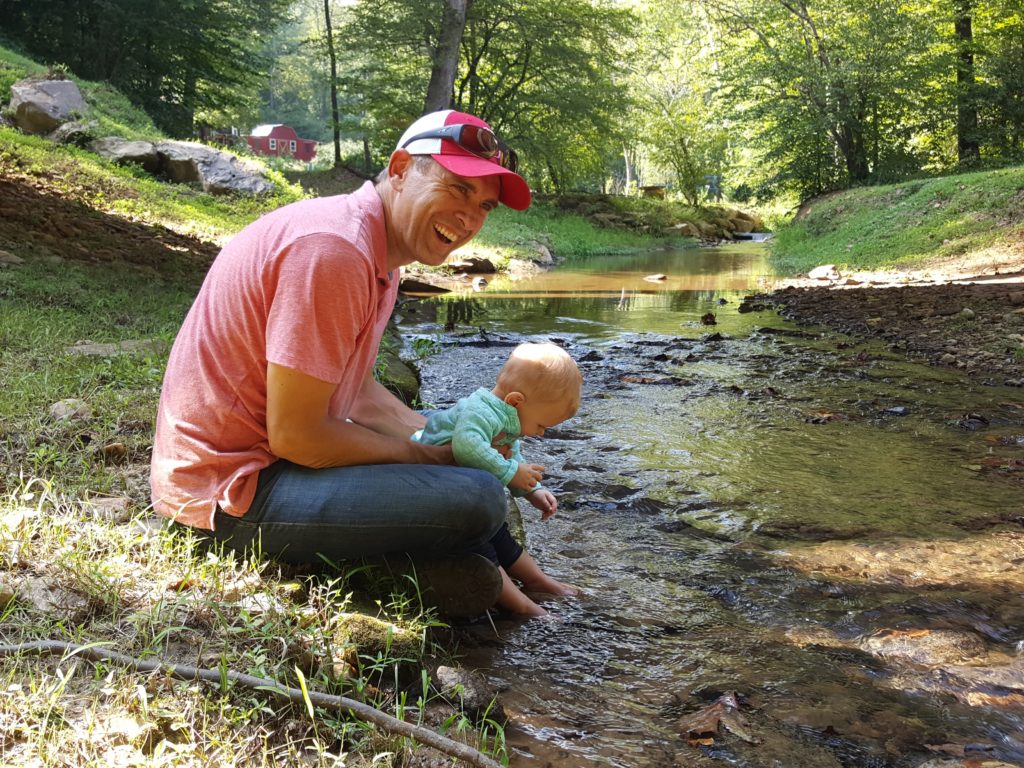
- Do you remember when you rode your bicycle around your neighborhood until your mom called you home at dusk?
- Do you remember when neighbors gathered on front porches for covered-dish suppers?
- When you walked next door to borrow a cup of sugar?
- When homes were built to last and reflected individualism, quality, and craftsmanship?
- When the change of seasons was cause for celebration and renewed interaction with the natural world around you?
- When you picked fresh tomatoes off the vine from your backyard garden?
Scott Austin, Owner-Developer at Olivette Riverside Community, does remember and he wants other folks to experience this uplifting and interactive way of life today. Step by step, home site by home site, his nostalgic reverie is materializing at this unique 350-acre property overlooking the French Broad River, just 6.7 miles from Asheville, NC. It’s a vision he shares with the other members of his team. What makes this vision even more remarkable is that it’s sustainable and replicable—not merely a “one-off.” And that’s an essential part of the vision.
Austin and his colleagues bought the Woodfin, NC, property in 2014 after the previous owners and their development project—a high-end gated community—went bankrupt. The new Olivette Riverside Community owners immediately began negotiating with the owners of an adjacent 46-acre family farm and purchased that property. They tore down the gate that was part of the original development and planted blueberry bushes as a statement of their intentions to live in harmony with nature. In 2015, they hired Jason Aiello to run the Olivette farm, which now includes a burgeoning CSA, supplies produce to a several upscale Asheville restaurants, and will one day wind up in the kitchens of Olivette residents. Eventually, there will also be an area for a smaller community garden, where homeowners will be able to cultivate their own plots.
Building a community of new homes alongside a working farm is a budding trend that pairs residential and agricultural life. The development model, known as “new urbanism” or building “agrihoods,” is already in use in areas around the U.S. But there’s nothing quite like it in Buncombe County, where farms are getting bought and turned into suburbs. The idea behind an agrihood is to intentionally preserve farmland for food, education, and for the community.
“We’re planning and building this community as an open-source development,” Austin explains. “We’ll share our experience with others in the hope that what we’re creating at Olivette is replicable. For this concept to be successful, we want to demonstrate that you can build a community that promotes healthy living and a shared food source. Of course, each community will need to accommodate its specific terrain.”
Farm life and home life are expected to feed and inspire one another. Currently, 10 beehives on the Olivette property help pollinate the farm and provide a local source of honey. “We have four horses and a donkey grazing on the property, and soon we’ll have chickens and goats to chomp back invasive plants,” Austin reports. “Our long-term plan includes a private school, and then we can use the farm as a learning tool for kids—and grown-ups.”
Although Scott’s vision is one of fostering community and a sustainable agrihood, this does not mean a development of cookie cutter homes. “Our goal is overall community blend, but a Dutch Colonial can fit beautifully next door to a contemporary home, as long as both homes reflect high quality in design and construction,” Scott emphasized. Architectural reviews will provide oversight to this aesthetic blend, as well as ensure green space is protected, along with views all the way to the river.
“We’ve cast a wide net in terms of lot and home size to attract a socio-economically diverse group of homeowners.” Scott stressed. “Don’t forget: we took down that gate so we could be more inclusive, to invite our neighbors onto our front porch, no matter how big that porch is. “We’re building a community, not a land investment. We’re building something we all love, and we’re counting on other people to love it, too.”


Leave a Reply